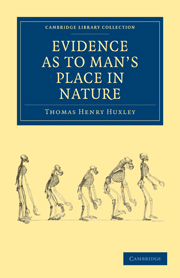II - ON THE RELATIONS OF MAN TO THE LOWER ANIMALS
Published online by Cambridge University Press: 29 August 2010
Summary
Multis videri poterit, majorem essse differentiam Simiæ et Hominis, quam diei et noctis; verum tamen hi, comparatione instituta inter summos Europæ Heroës et Hottentottos ad Capnt bonæ spei degentes, difficillime sibi persuadebunt, has eosdem habere natales; vel ei virginem nobilem aulicam, maxime comtam et humanissimam, conferre vellent cum homine sylvestri et sibi relicto, vix augurari possent, hunc et illam ejusdem esse speciei.
– Linnæi Amænitates Acad. “Anthropomorpha.”The question of questions for mankind—the problem which underlies all others, and is more deeply interesting than any other—is the ascertainment of the place which Man occupies in nature and of his relations to the universe of things. Whence our race has come; what are the limits of our power over nature, and, of nature's power over us; to what goal we are tending; are the problems which present themselves anew and with undiminished interest to every man born into the world. Most of us, shrinking from the difficulties and dangers which beset the seeker after original answers to these riddles, are contented to ignore them altogether, or to smother the investigating spirit under the featherbed of respected and respectable tradition. But, in every age, one or two restless spirits, blessed with that constructive genius, which can only, build, on a secure foundation, or cursed with the mere spirit of scepticism, are unable to follow in the well-worn and comfortable track of their forefathers and contemporaries, and unmindful of thorns and stumbling-blocks, strike out into paths of their own.
- Type
- Chapter
- Information
- Evidence as to Man's Place in Nature , pp. 57 - 118Publisher: Cambridge University PressPrint publication year: 2009First published in: 1863



